Wondering how long your car battery will last in Florida’s intense heat? We understand the frustration of unexpected battery failures, especially when the Sunshine State’s climate can be particularly tough on vehicle components.
Florida’s combination of high temperatures, humidity, and seasonal driving patterns creates unique challenges for car batteries. While the average battery lifespan is 3-5 years in moderate climates, Florida’s extreme conditions can significantly reduce this timeframe. We’ll explore exactly what factors affect your battery’s longevity and how you can maximize its lifespan even though the challenging environment.
The Average Lifespan of Car Batteries in Florida
Car batteries in Florida typically last 2-3 years compared to the 3-5 years expected in more temperate climates. Florida’s combination of extreme heat and high humidity creates particularly harsh conditions for battery components. Summer temperatures regularly exceeding 90°F accelerate chemical reactions inside batteries, causing faster deterioration of internal components.
Heat exposure breaks down battery materials more quickly, with each 15°F increase above 77°F potentially cutting battery life by 50%. The average daily temperature in cities like Miami and Orlando regularly exceeds this threshold for most of the year, creating constant stress on vehicle batteries.
Humidity compounds these problems by promoting corrosion on battery terminals and connections. Seasonal variations also play a role, with batteries working harder during summer months to power air conditioning systems while enduring higher engine compartment temperatures.
Vehicle usage patterns in Florida further impact battery longevity. Short trips prevent full recharging, while long periods of inactivity during vacation seasons or for seasonal residents can lead to battery drainage. Premium batteries with higher cold cranking amps (CCA) ratings and enhanced heat resistance often deliver better performance even though costing more initially.
How Florida’s Climate Affects Battery Life
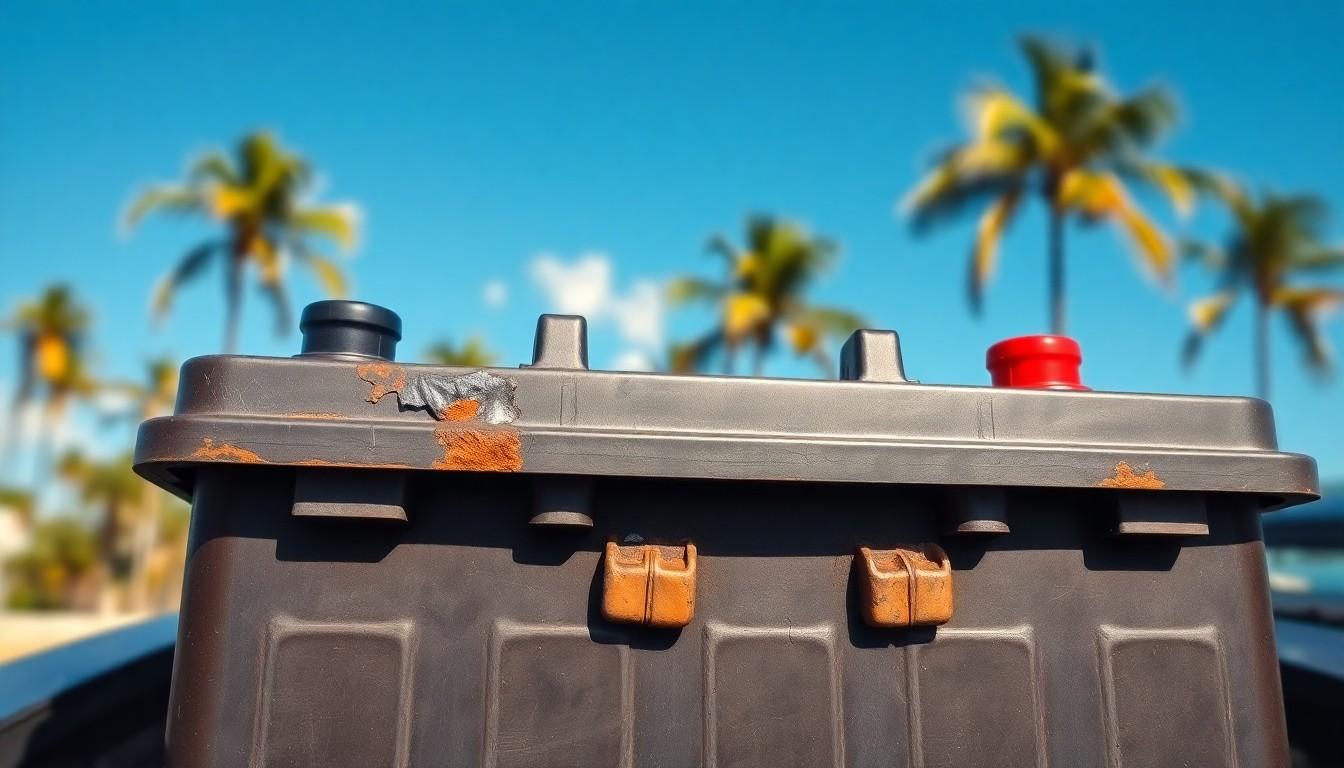
Florida’s sweltering climate creates a perfect storm of conditions that significantly reduce car battery lifespan. The combination of extreme heat and high humidity forms a particularly harsh environment for batteries, accelerating deterioration and shortening overall service life to just 2-3 years compared to 4-6 years in cooler regions.
Impact of Extreme Heat on Battery Components
Heat acts as a battery killer in Florida, damaging critical internal components through multiple mechanisms. Temperatures regularly exceeding 90°F accelerate the chemical reactions inside batteries, causing faster degradation of the electrolyte solution. This acceleration leads to premature sulfation, where harmful lead-sulfate crystals form on battery plates, reducing capacity and conductivity. Battery plates also frequently buckle under Florida’s intense heat, creating physical deformation that compromises internal connections. Many Florida drivers experience rapid battery fluid evaporation, requiring more frequent maintenance checks during summer months. The ideal operating temperature for car batteries ranges between 77-80°F, but Florida’s climate routinely pushes well beyond this threshold, especially during the scorching summer months.
Humidity and Corrosion Concerns
High humidity levels combine with heat to create additional battery challenges unique to Florida’s climate. Moisture in the air promotes rapid corrosion formation on battery terminals and connections, creating resistance that reduces charging efficiency. Florida’s coastal areas experience particularly aggressive corrosion due to salt air, which can penetrate engine compartments and accelerate the oxidation process. Battery casings often develop microscopic cracks from thermal expansion, allowing humidity to penetrate and contaminate internal components. Moisture buildup around electrical connections leads to power leakage, slowly draining batteries even when vehicles aren’t in use. Regular terminal cleaning with baking soda solution helps combat these corrosion issues, though Florida’s persistent humidity means maintenance needs are much higher than in drier climates.
Signs Your Florida Car Battery Is Failing
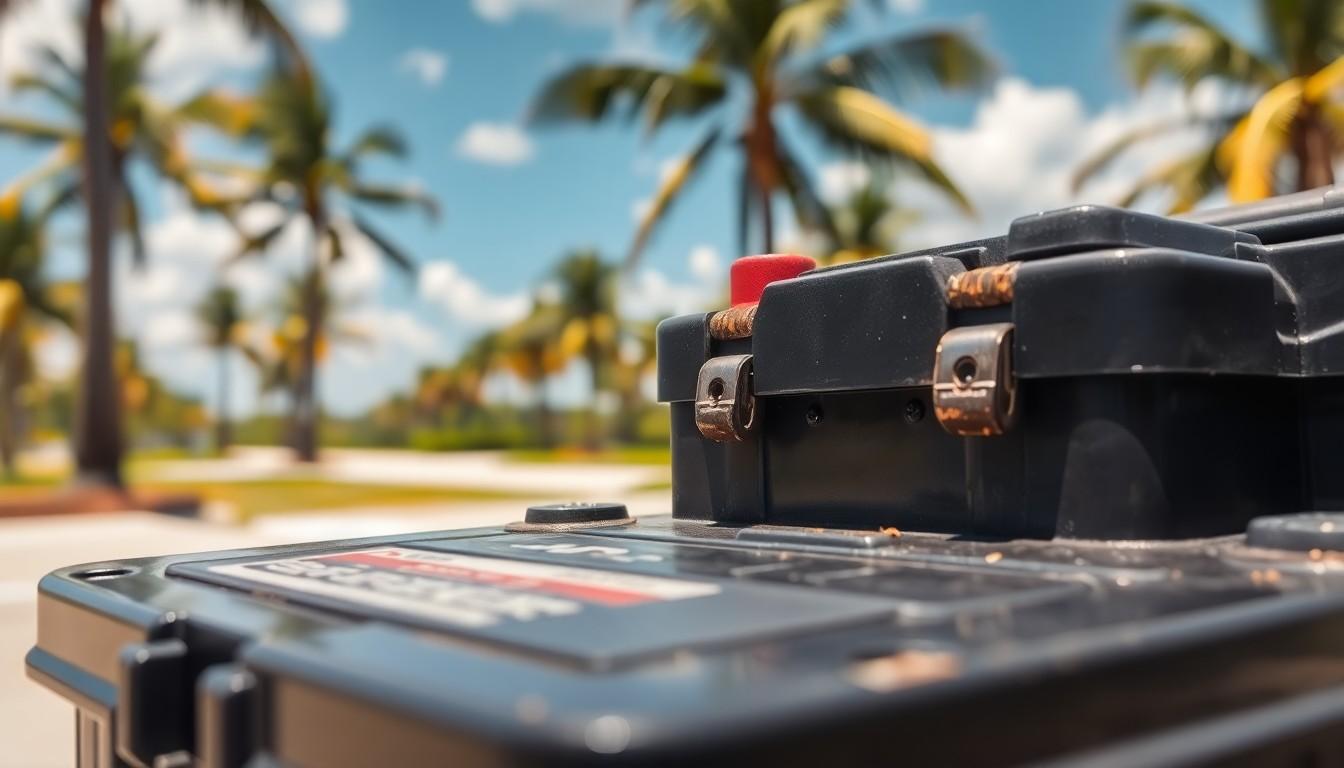
Recognizing when your car battery is failing can save you from unexpected breakdowns in Florida’s challenging climate. The extreme heat conditions in the state accelerate battery deterioration, making it crucial to identify warning signs early.
Warning Indicators to Watch For
Florida’s heat takes a important toll on car batteries, often revealing several telltale signs before complete failure. A slow engine crank is one of the most common indicators—if your car takes longer than usual to start, your battery’s power is likely diminishing. Dim or flickering headlights also signal battery weakness, as the power supply becomes inconsistent when the battery deteriorates.
Physical changes like a swollen battery case directly result from Florida’s high temperatures, causing internal components to expand and indicating imminent failure. Corrosion on battery terminals appears as a white, blue, or greenish substance that disrupts electrical connections and accelerates battery degradation in Florida’s humid environment.
Age remains a critical factor—since Florida batteries typically last only 2-5 years (averaging around 3 years), batteries approaching this timeframe warrant close monitoring. Unexpected vehicle shutdowns without warning often indicate the battery can no longer hold sufficient charge to power your vehicle’s systems consistently.
Regular inspection of these warning signs can help you anticipate battery failure and replace it before experiencing a complete breakdown in Florida’s punishing climate conditions.
Extending Your Car Battery Life in Florida
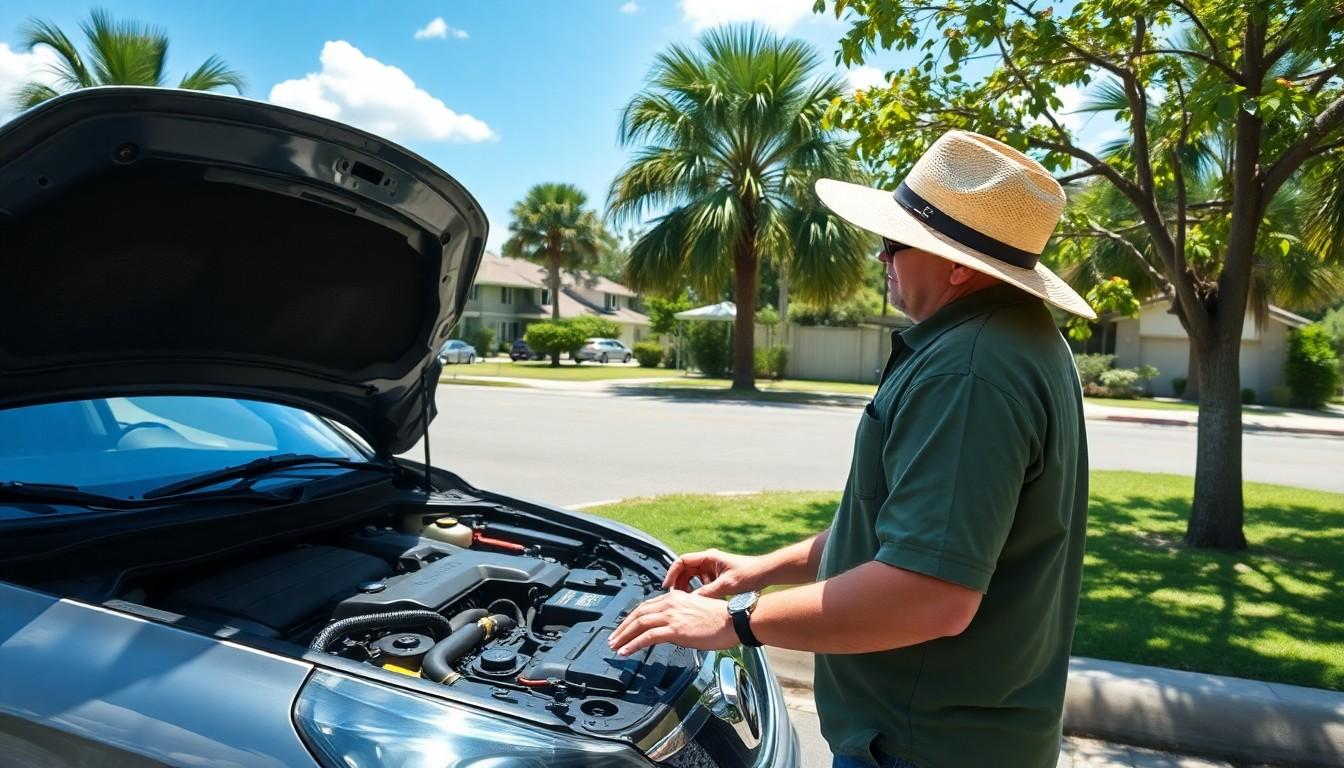
Even though Florida’s harsh climate, you can significantly extend your car battery’s lifespan with proper care and preventive measures. Following exact maintenance practices and taking protective steps against the extreme heat can help you maximize your battery’s service life beyond the typical 2-3 year average.
Proper Maintenance Tips
Regular maintenance is crucial for preserving battery health in Florida’s challenging environment. Check your battery terminals frequently for corrosion, which appears as a white, blue, or greenish substance that can interrupt electrical connections and drain power. Tight terminal connections are essential for optimal battery performance and prevent unnecessary power loss. Schedule routine battery health testing to identify potential issues before they lead to complete failure. Consistently driving your vehicle helps maintain proper charge levels, as batteries in cars that sit unused for extended periods tend to drain faster. Avoid leaving your car inactive for long stretches—even a short weekly drive can help keep the battery charged and functioning properly.
Protective Measures for Hot Weather
Florida’s intense heat demands additional protective strategies to shield your battery from premature failure. Using reflective windshield shields when parking can significantly reduce heat buildup in your engine compartment, creating a more favorable environment for your battery. Whenever possible, park in shaded areas or covered garages to minimize direct exposure to the scorching Florida sun. Choose batteries specifically designed for extreme weather conditions, as these models often include enhanced features that help them withstand high temperatures. During summer months with temperatures regularly exceeding 90°F, increasing the frequency of your maintenance checks can help catch heat-related issues early. Coastal residents should pay extra attention to battery maintenance, as salt-laden air accelerates corrosion and can further shorten battery life.
Best Battery Types for Florida’s Climate
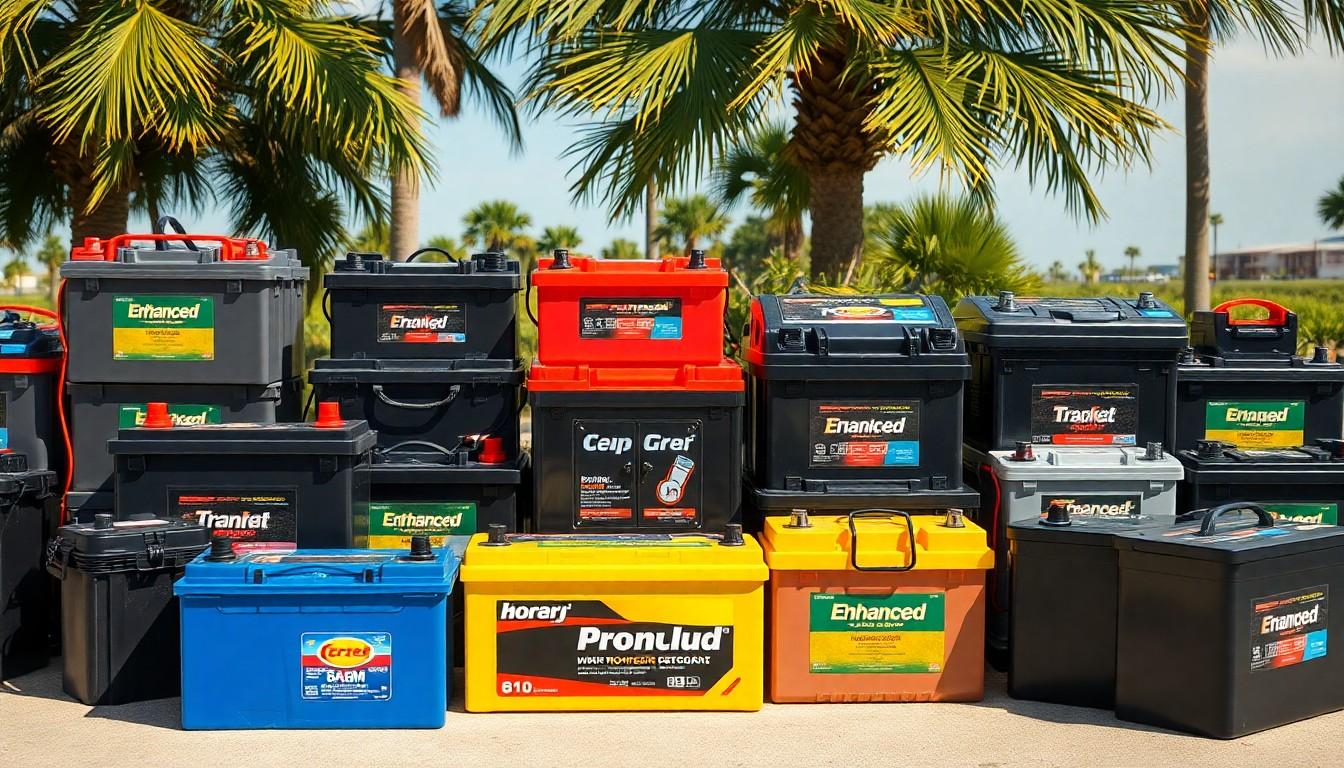
Florida’s hot, humid environment demands specialized car batteries designed to withstand extreme conditions. On average, batteries last only 2-3 years in Florida compared to 4-6 years in cooler regions, making proper battery selection crucial for vehicle reliability.
High-Temperature Tolerant Batteries perform exceptionally well in Florida’s climate. These batteries feature enhanced internal components specifically engineered to resist degradation from sustained heat exposure. Many manufacturers now offer models with improved plate construction and electrolyte formulations that maintain stability even when temperatures consistently exceed 90°F.
Maintenance-Free Batteries are ideal for Florida drivers looking to minimize upkeep. These sealed units eliminate the need for water level checks and reduce terminal corrosion issues common in humid environments. Their design typically includes calcium-infused plates that resist deterioration even during Florida’s intense summer months.
AGM (Absorbed Glass Mat) Batteries offer superior heat resistance and durability for Florida’s challenging conditions. These premium options use fiberglass mats saturated with electrolyte solution between the lead plates, preventing internal evaporation. AGM technology also provides excellent vibration resistance and faster recharging capabilities, making them worth the higher initial investment for Florida residents.
Enhanced Flooded Batteries with specialized grid designs provide a cost-effective alternative for Florida drivers. These improved versions of traditional lead-acid batteries incorporate corrosion-resistant components and enhanced plate separators that extend lifespan in high-temperature environments. Many feature reinforced cases to prevent bulging during heat-induced expansion.
Regular battery testing remains essential regardless of battery type chosen. Even high-performance batteries require periodic inspection in Florida’s extreme climate to ensure optimal function throughout their shortened lifespan.
When to Replace Your Car Battery in Florida
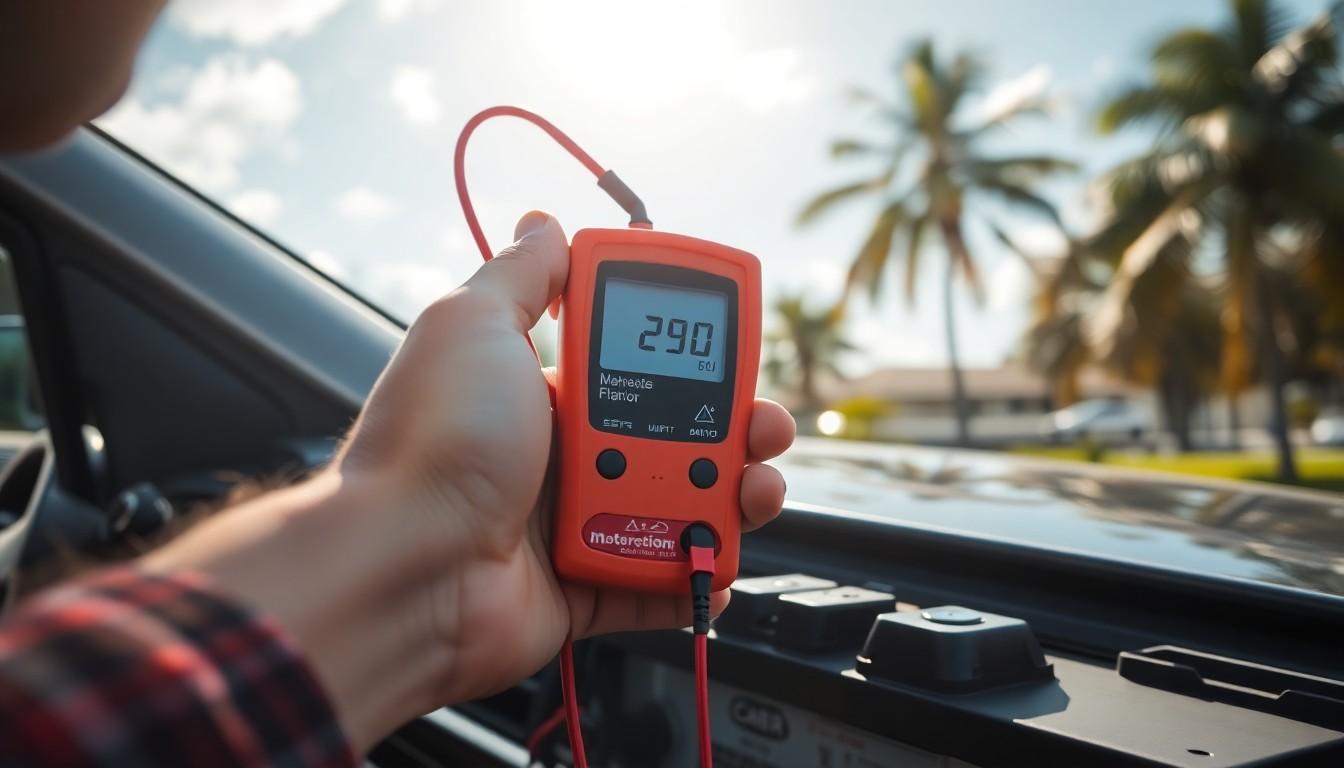
Signs Your Battery Is Failing
Florida’s harsh climate accelerates battery deterioration, making it crucial to recognize warning signs early. Difficulty starting your vehicle, particularly a slow engine crank that takes longer than usual, indicates your battery’s power is diminishing. Dim headlights or interior lights that flicker when idling suggest inadequate power supply from a weakening battery. Electronic components may behave erratically as battery charge becomes inconsistent, affecting everything from your radio to power windows.
Age-Based Replacement Guidelines
Car batteries in Florida typically last between 2 to 5 years, with an average lifespan of approximately 3 years – significantly shorter than the 5+ years experienced in cooler climates. Proactive replacement becomes essential as your battery approaches the 3-year mark, even if it’s still functioning. Regular testing twice yearly helps track battery health decline, with more frequent checks recommended during summer months when heat stress peaks. Many auto parts stores and service centers offer free battery testing services to help determine remaining battery life.
Seasonal Considerations
Summer months in Florida present the greatest threat to battery longevity, warranting extra vigilance from May through September. Planning battery replacements during spring gives you fresh power before the most challenging season begins. Hurricane season preparation should include battery assessment, as vehicle reliability becomes especially important during severe weather events. Testing your battery before long road trips prevents unexpected failures away from home, where service might be limited.
Conclusion
Florida’s harsh climate presents unique challenges for car batteries with lifespans averaging just 2-3 years compared to 4-6 years in cooler regions. The extreme heat accelerates internal deterioration while humidity promotes corrosion especially in coastal areas.
To maximize your battery’s lifespan we recommend regular maintenance checks investing in heat-resistant battery types and implementing protective measures like parking in shaded areas. Don’t wait for complete failure—look for warning signs like slow cranking engines and dim headlights.
Proactive replacement as your battery approaches the 3-year mark can save you from unexpected breakdowns. Consider spring replacements to prepare for summer’s intensity and always test your battery before long road trips.
With proper care and attention you can help your car battery withstand Florida’s challenging environment and avoid being stranded in the Sunshine State.
Frequently Asked Questions
How does Florida’s climate affect car battery life?
Florida’s intense heat and humidity can reduce car battery life to just 2-3 years, compared to 4-6 years in cooler regions. Temperatures over 90°F accelerate chemical reactions inside batteries, while each 15°F increase above 77°F can potentially cut battery life by 50%. High humidity also promotes corrosion on terminals and connections, further compromising battery performance.
What are the signs my car battery is failing?
Look for slow engine cranking, dim or flickering headlights, electronic components behaving erratically, and a dashboard battery warning light. Physical signs include a swollen battery case, corrosion on terminals, and a battery that’s more than 3 years old. In Florida’s climate, these warning signs often appear more quickly than in cooler regions.
What type of car battery works best in Florida?
High-Temperature Tolerant Batteries, Maintenance-Free Batteries, AGM (Absorbed Glass Mat) Batteries, and Enhanced Flooded Batteries are ideal choices for Florida. AGM batteries offer superior heat resistance and durability, while maintenance-free options reduce corrosion issues. Regardless of type, choose batteries specifically designed to withstand extreme weather conditions.
How often should I replace my car battery in Florida?
Car batteries in Florida typically last 2-3 years, significantly shorter than the national average. Plan for proactive replacement as your battery approaches the 3-year mark, especially if you notice any performance issues. Regular testing during summer months helps track battery health and prevent unexpected failures.
What maintenance can extend my car battery’s life in Florida?
Regularly check for terminal corrosion and clean as needed. Ensure connections remain tight and schedule routine battery health tests. Park in shaded areas when possible and use reflective windshield shields to reduce heat exposure. Drive your vehicle consistently, as batteries in inactive cars drain faster in Florida’s heat. Increase maintenance checks during summer months.
When is the best time to replace a car battery in Florida?
Spring is the ideal time to replace your battery before summer’s extreme heat arrives. This proactive approach helps ensure your new battery isn’t immediately stressed by peak temperatures. Always test your battery before long road trips, especially if it’s over 2 years old, to avoid unexpected failures during travel.

